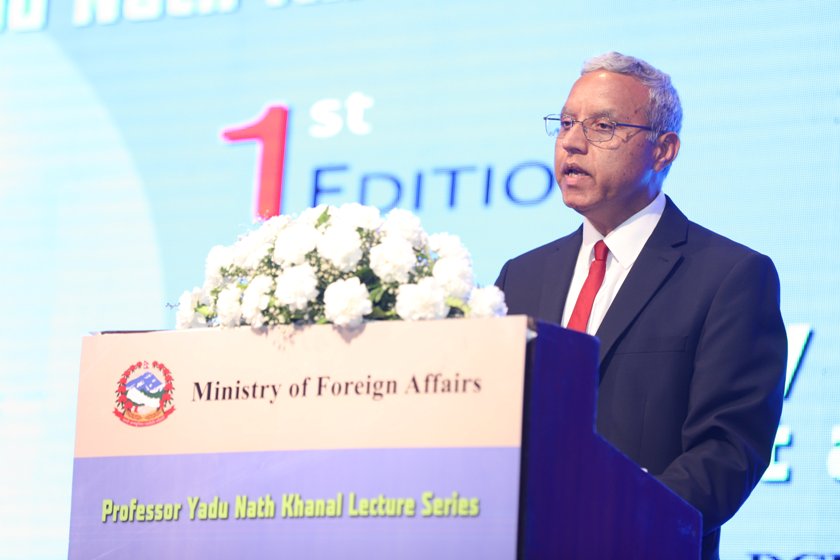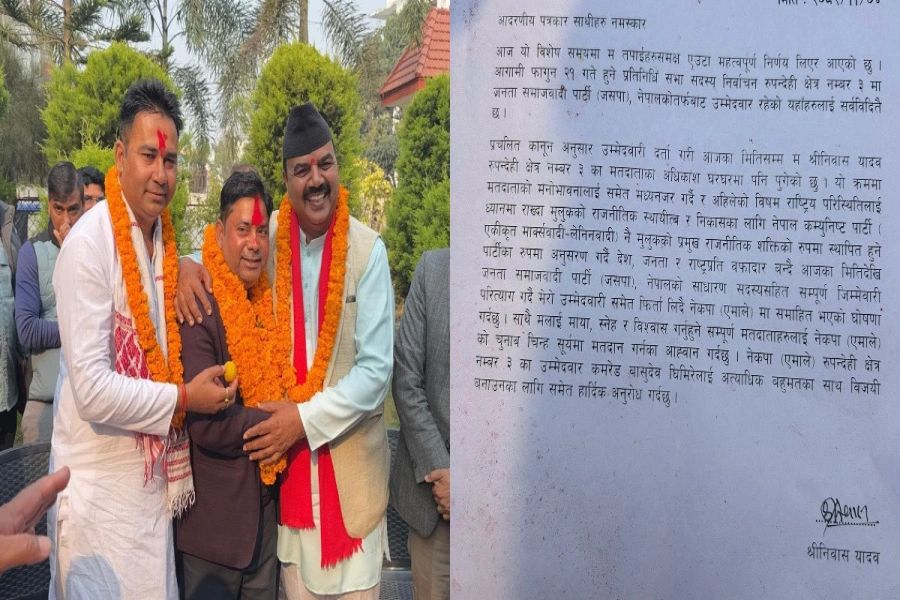While ‘neutrality’ itself is a sensitive issue in international relations, it becomes more sensitive in Nepal’s existing geo-strategic situation. What type of neutrality Nepal would pursue if there would be a cyber, geostrategic or physical battle among the three powers — China, India and the US — that could induce a geo-digital and geophysical effect in Nepal?
There has been a hot debate in parliament, media houses, social media and the streets of Kathmandu regarding the “State Partnership Program” (SPP) of the US in recent days. SPP is said to be a military partnership program of the government of the US with other like-minded countries. It is still unclear whether the government of Nepal has signed an SPP agreement with the US with the government not officially issuing any statement regarding it as of yet. Meanwhile, there is growing blaming and counter-blaming among political parties and their leaders regarding who took the ‘first decision’ to move forward with the SPP in the past. The army chief, while being grilled by the International Relations Committee of the House, acknowledged that the Nepal Army had sent a letter to the US Army regarding SPP in the past, but the agreement had not been made. Meanwhile, the Nepal Army has issued a statement declaring that it has not made any such agreement with the US Army or the government and that it will not make such an agreement in the future. The US embassy in Nepal issued a statement saying that the US government has not forced the Government of Nepal to sign such an agreement, yet it will sign it if the Government of Nepal wants. The US influenced Nepal to be a part of the Indo-Pacific Strategy (IPS) in the past, but Nepal did not join it following massive debates in Kathmandu. Similarly, the MCC has been ratified followed by appalling drama and disgrace in parliament.
Here the crucial concern of the general public is that Nepal should not join any military alliance with any country by going beyond Nepal’s long-standing “Non-Aligned Foreign Policy”. Nepalis do not anticipate any war in Nepal and its surroundings as they have witnessed horrific international wars in the past, and currently witness one — the Russia-Ukraine conflict. This is, perhaps, the main reason Nepalis are afraid of military alliance with any country that possibly invites war in Nepal at any time. Subsequently, ‘non-alignment’ and ‘neutrality’ have been deep-rooted in the psyche of Nepali folks. There is, however, a misconception in understanding the terms — ‘non-alignment’, ‘neutrality’, ‘alliance’ and ‘partnership’ — in a large section of people while they have specific meanings in foreign policy, diplomacy and bilateral relations. For instance, the initial nature of BRI and MCC sounded like partnership programs, but, the political parties in Nepal created muddles in attempts of weakening each other in domestic politics that frustrated the general public to perceive these programs as part of a military alliance or potential alliance. Yet, the true essence or consequence of ‘alliance’ and ‘partnership’ depends upon the nature of the agreement initially carried out between the parties concerned.
The Ministry of Foreign Affairs recently organized a ‘Talk Series’ dedicated to veteran diplomat Prof Yadu Nath Khanal, where Prof Surya Subedi, Professor of Leeds University, Britain, was the chief speaker — who presented a paper entitled “Nepal’s Foreign Policy: Past, Present and Future” — where he emphasized “permanent neutrality” in Nepal’s Foreign Policy. He, however, did not discuss the features, norms, obligations or potential consequences of “permanent neutrality”.
Under international treaty, ‘permanent neutrality’ means to “remain under a legal obligation to not to participate in any future war”- that is war between states (specifically, a war involving other states). The law of neutrality (The Hague Conventions, 1907) defines the rights and obligations of a neutral state “to refrain from engaging in war; to ensure its defense; to ensure equal treatment for belligerent states in respect of the exportation of war material; to not to supply mercenary troops to belligerent states; to not allow belligerent states to use its territory”. The Hague Conventions define neutrality, particularly, being specific to ‘War on Land’ and ‘War at Sea’, while the modern-day war is protracted beyond land and sea and is focused on digital space or the virtual world as well.
Net Neutrality in Nepal

Principally, neutrality, in foreign policy, means to remain neutral in bilateral or multilateral affairs, whereas the first country is not a patron of that affair. Thus, neutrality should be understood as ‘non-intervention’ or ‘non- interference’ in other countries’ affairs. Yet, what if the first country is psychologically, logically and physically close to the part of that affair? While ‘neutrality’ itself is a sensitive issue in international relations, it becomes more sensitive in Nepal’s existing geo-strategic situation. What type of neutrality Nepal would pursue if there would be a cyber, geostrategic or physical battle among the three powers — China, India and the US — that could induce a geo-digital and geophysical effect in Nepal? For instance, say, China controlled Taiwan, and the US attacked China as a counteraction, meanwhile, India remained neutral as it did on the Russia-Ukraine issue (India is likely to espouse ‘Constructive Neutrality’ on the China-Taiwan issue as “India is gradually managing its relations with China”). What role Nepal would play in that particular situation? Can Nepal defend its independence and territorial integrity with its ‘own armed forces’ under the policy of ‘permanent neutrality’ if international armed conflicts between those powers induced a ‘domino effect’ in Nepal?
Since foreign policy itself is a ‘dynamic’ concept in international relations; so should the policy of neutrality, particularly for Nepal. Neutrality should be a dynamic policy, not static; neutrality has to be a ‘constructive’ and ‘pragmatic’ policy, but not an ‘unassailable dogma’. Neutrality is a ‘status’, not a ‘stance’ or ‘rigid statute of foreign and security policy’. So, neutrality should be considered as a “flexible instrument to safeguard the independence, security and welfare of the country”, while there should not be “Neutrality of Opinion” — that is in political opinions, partnerships and cooperation as Switzerland has pursued.
Non-alignment, on the other hand, is a ‘political concept’. “Non-alignment” is a foreign policy adopted by Nepal at the time of the Cold War, which Nepal has long regarded as a “policy of nonparticipation in the military affairs of the bipolar world…”. Nepal still believes in “Non-Aligned Foreign Policy” even when there is a significant difference between Soviet-American ‘Cold War’ politics and present-day world politics. While the world is again witnessing modern-day bipolarity between the US and China, which is largely focused on tech, trade, sea, cyberspace and the virtual world. There is also a ‘tectonic shift’ in Cold War location, which can directly affect Nepal – digitally, economically, geo-strategically and physically.
Nevertheless, if we take a look back at Nepal’s history, its foreign policy is mostly rooted in the ‘survival strategy’, while the policy of neutrality has been just as a ‘hiding’ and ‘binding’ principle. “Whether neutrality has helped Nepal in moving beyond the survival strategies”, writes Gaurav Bhattarai in his book “Nepal Between China and India – Difficulty of Being Neutral”. Well, ‘survival strategy’ itself could be a policy that should serve Nepal in safeguarding its national interest.
Nepal, however, succeeded in maintaining neutrality in the past based on the sensitivity of issues and situations to some extent. For instance, Nepal adopted ‘Principled Neutrality’ in its foreign policy with its immediate neighbors during the era of Prithvi Narayan Shah which helped in keeping national sovereignty and integrity intact. Nepal pursued ‘Committed Neutrality’ during the Sino-Indian war in 1962 despite American willingness to help Nepal (and India) in their defense against China. Nepal adopted ‘Silent Neutrality’ during several issues such as the first nuclear tests carried out by both the USSR and China, the Doklam issue, the Indo-Pak conflicts (except during the premiership of KI Singh), and the Malaysia-Indonesia conflicts. Likewise, Nepal executed ‘Strategic Neutrality’ during the Vietnam War and balanced its relations with the US, China and the USSR, while all remained Nepal’s good friends even when Nepal mentioned ‘outside interference’ without tagging the US as an aggressor. Nepal, however, adopted ‘Hushed Neutrality’ in the case of Lipulekh; and its sufferings in 1962, 1989 and 2015, which, perhaps, is in the name of peace, friendship, and historical ties. Despondently, Nepal could neither pursue ‘principled’ nor ‘constructive’ neutrality’ in the recent Russia-Ukraine conflict. Instead, it became an ardent vocalist and issued a statement in a great hurry (though neutrality is not about “Neutrality of Opinion’), and subsequently voted against Russia to suspend it from the UN Human Rights Council (though neutrality is not applied in country’s fundamental values such as ‘democracy’ and ‘human rights’), while the neighboring countries — India and China — abstained on the same issue. Nepal could have adopted ‘constructive neutrality’ on that issue as India executed.
Nepal should be firm on its policy of ‘non-alignment’, but the policy of neutrality has to be scrutinized based on dynamicity in international relations, which could help maximize its power and minimize the other power’s influence. No foreign policy today is permanent. Accordingly, Nepal’s foreign policy should also be pragmatic based on time and the changing dynamics of global geopolitics. Even a small power like Nepal can play a very constructive role in shaping the dynamics of international relations and can influence the nature of regional (and international) politics like Singapore and Switzerland are doing, with Nepal possessing a more appealing geo-strategic situation to ‘affect the system’ than both of the countries have.
Nonetheless, the essence of neutrality is equally significant today, but it should not be “one for all”. Neutrality should be ‘adjusted and adapted’ based on the regional and international contexts and situations. Nepal should not be obliged to practice the policy of neutrality based on the retrospective lens of “Cold War Neutrality”. It should rather be housed on a futuristic lens by comprehending its history and existing economic, cultural, geostrategic and geopolitical situation. Philosophy alone does not work in foreign policy; there should be rationality in achieving national objectives while diplomacy is the only tool that can make an adroit use of its diplomatic capital to advance national interests. So, Nepal should strengthen its relations in all directions and get larger access to the global world by making globalization, an open world economy, multiculturalism, and soft powers as its diplomatic tools. Essentially, Nepal should balance its relations with all the powers — regional and global — maintain good friendships with them, and extend the scope of its maneuverability by adopting the policy of ‘constructive neutrality’ that could replicate the dynamicity of Nepal’s foreign policy.






































